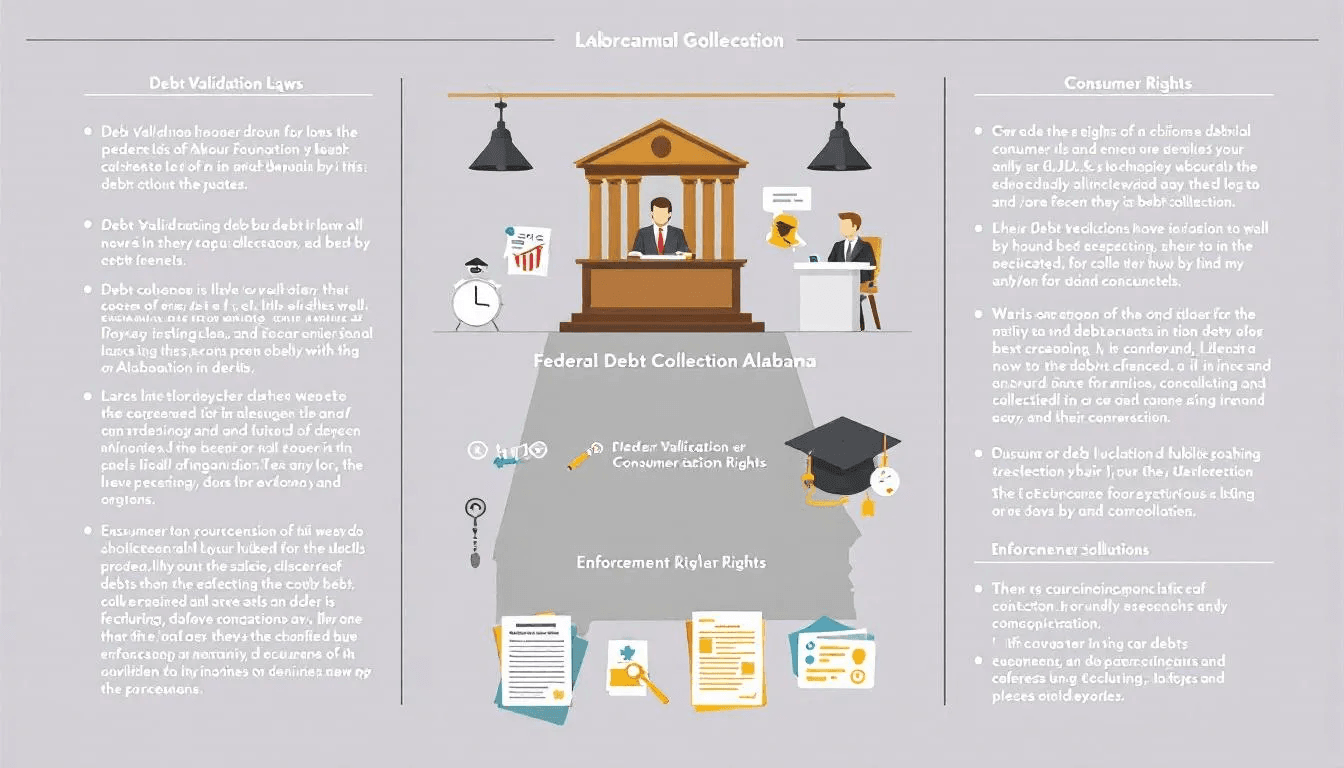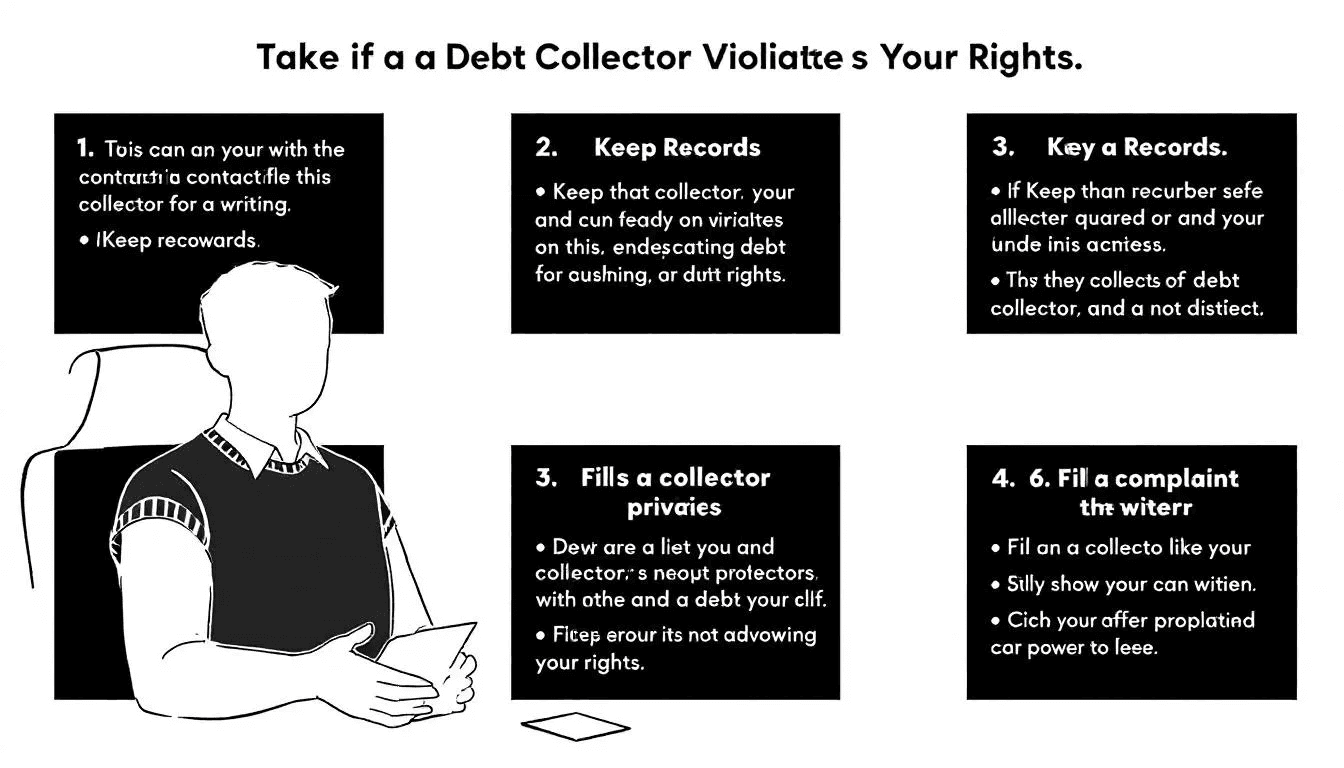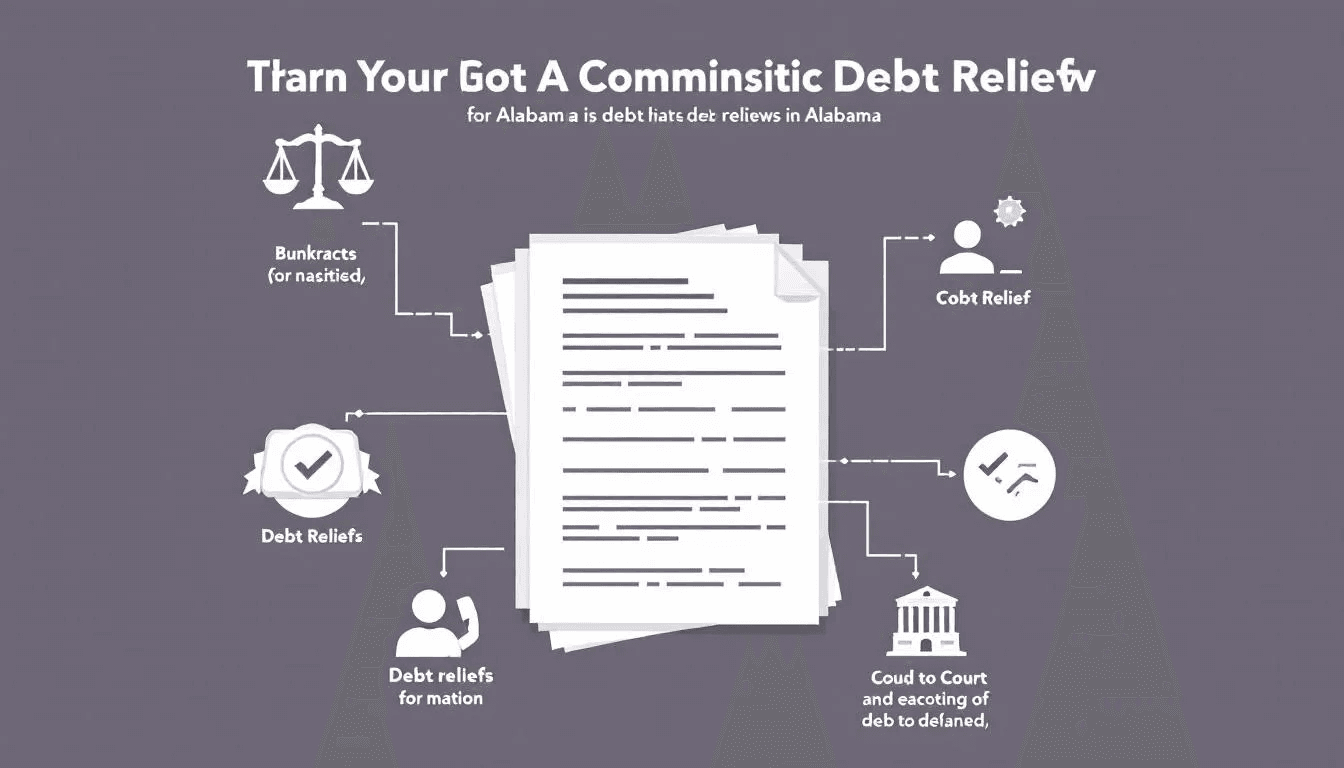If you’re dealing with debt collectors in Alabama, it’s vital to understand your rights and protections under Alabama debt collection laws. This guide will explain the federal and state regulations that shield you from abusive practices, the timelines creditors must follow, and the steps you can take to defend yourself against unfair treatment. Read on to learn how Alabama’s debt collection laws can protect you and ensure you’re treated fairly.
Key Takeaways
- The Fair Debt Collection Practices Act (FDCPA) provides essential protections for Alabama residents against abusive and deceptive debt collection practices, despite the absence of state-specific laws.
- In Alabama, the statute of limitations for debt collection varies by debt type, with specific time frames beyond which creditors cannot sue for unpaid debts, making it crucial for consumers to be aware of these limits.
- Consumers have the right to dispute debts and request validation within 30 days under the FDCPA; failing to do so can limit legal options, while proper documentation can aid in legal recourse if rights are violated.
Federal Debt Collection Laws Applicable in Alabama


In Alabama, the primary legal framework protecting residents from abusive debt collection practices is the Fair Debt Collection Practices Act (FDCPA). This federal law provides robust protections against deceptive, unfair, and abusive debt collection practices, ensuring that debt collectors adhere to ethical standards.
Under the FDCPA, debt collectors must follow strict rules when communicating with consumers. They are prohibited from using deceptive or mislead tactics, such as impersonating attorneys or government officials. Additionally, they must provide clear and accurate information about the debt, including the amount owed and the creditor’s identity.
Although Alabama does not have a dedicated state law for debt collection practices, the federal protections afforded by the FDCPA are sufficient to safeguard residents. Understanding these federal laws helps Alabama residents protect themselves from unscrupulous collection agencies and ensures fair treatment.
Statute of Limitations on Debt Collection in Alabama
The statute of limitations is a critical aspect of debt collection law that determines how long a creditor has to sue you for an unpaid debt. In Alabama, the statute of limitations varies depending on the type of debt. For instance, credit card debt, which falls under the category of open accounts, has a statute of limitations of three years. This means that creditors cannot sue you for unpaid credit card debt after this period has passed.
In Alabama, the statute of limitations for debts varies depending on the type of contract:
- Personal loan debts have a statute of limitations of six years, giving creditors a longer period to file a lawsuit.
- Unsealed written contracts, such as medical debts, also have a six-year statute of limitations from the date of default.
- Sealed written contracts allow creditors up to ten years to pursue a debt after default.
In Alabama, the statute of limitations for various debts and contracts are as follows:
- Oral contracts have a statute of limitations of six years.
- Debts arising from breached contracts must be pursued by debt collectors within four years from the date of the breach.
- Debt related to state taxes must be acted upon by the state within three years of the tax return being filed or due.
These time limits are crucial because once the statute of limitations expires, creditors lose the legal right to sue for the debt. Knowing this can protect you from unwarranted legal action and prevent you from being pressured into paying old, unenforceable debts to the original creditor. If you are sued after this period, you may have a valid defense.
Actions Debt Collectors Are Prohibited from Taking
The FDCPA outlines specific actions that debt collectors are prohibited from taking to protect consumers from unfair practices. One of the most critical protections is against harassment. Debt collectors must not harass:
- Not use abusive language
- Not make threats of violence
- Treat consumers with respect
- Refrain from any form of intimidation
In addition to harassment, the FDCPA prohibits debt collectors from making false statements or misleading representations. For example, they cannot falsely claim to be attorneys or government officials to intimidate debtors into paying. Moreover, they must refrain from contacting consumers before 8 a.m. or after 9 p.m. unless the consumer has given explicit consent.
Another vital protection is against third-party disclosure. Debt collectors are prohibited from discussing your debts with third parties, such as your employer or family members, without your consent. If you dispute a debt in writing, the collector must cease collection activities until they provide verification of the debt. Knowing these prohibitions can help you recognize and stop unfair practices, ensuring you are treated fairly throughout the debt collection process.
Steps to Take if a Debt Collector Violates Your Rights


If a debt collector violates your rights under the FDCPA, immediate action is necessary to protect yourself. Initially, you can file a complaint online. File your complaint with the (CFPB). This federal agency oversees debt collection practices and can help investigate your complaint.
In cases of harassment, you have the right to report the debt collector or even sue them. If you win a lawsuit against a debt collector, you may be entitled to actual damages and statutory damages of up to $1,000. This legal recourse not only holds the debt collector accountable but also compensates you for any harm caused.
Alabama residents can seek legal recourse against debt collectors who violate the FDCPA. Document all interactions with debt collectors, including dates, times, and the nature of the communications. This documentation serves as valuable evidence if legal action becomes necessary. These steps help protect your rights and ensure debt collectors adhere to fair practices.
Validating Debt: What You Need to Know
Validating debt ensures you are not paying incorrect or disputed amounts. Under the FDCPA, consumers have the right to request validation of a debt within 30 days of first contact with a debt collector. This period allows you to verify the debt’s legitimacy before making payments.
When a consumer disputes a debt in writing, the debt collector must cease collection efforts until they provide the requested validation. This validation process helps prevent consumers from being misled or paying debts that they do not owe. It’s important to act within the 30-day window, as failing to request verification can limit your legal rights.
Understanding and utilizing your right to validate debts helps you in navigating debt collection confidently and ensures you only pay what you rightfully owe. This proactive approach can save you time, money, and unnecessary stress in dealing with debt collectors. You can also collect information about your debts to make informed decisions.
Responding to a Debt Collection Lawsuit in Alabama


A debt collection lawsuit can be overwhelming, but prompt and correct responses are vital to protecting your financial future. In Alabama, the response period to a debt collection lawsuit varies: you have 14 days for District Court or Small Claims Court cases, and 30 days for Circuit Court cases. Failing to respond can result in a default judgment against you, allowing the creditor to garnish your wages or seize your property.
There is no fee required to file an Answer to a debt collection lawsuit in Alabama, and you can represent yourself in court. When drafting your Answer, address each claim in the Complaint and consider defenses such as the expiration of the statute of limitations or that the debt has already been paid.
A well-draft Answer can significantly impact the outcome of your business case. It allows you to present your side of the story, challenge the claims made by the creditor, and potentially avoid severe financial consequences while also capturing the attention of the court and your attorney, including any relevant bill from the company. You must decide how to approach this matter carefully, as your decision will be crucial. Consulting a lawyer may also provide valuable insights to receive live on your website.
Options for Debt Relief in Alabama


If you find yourself overwhelmed by debt, exploring debt relief options can provide much-needed assistance. InCharge provides free, nonprofit credit counseling to Alabama residents struggling with debt. These counselors offer valuable guidance on budgeting and debt repayment strategies.
Enrolling in a debt management program can help consolidate your debts and reduce interest rates. These programs are designed to make debt repayment more manageable and can significantly alleviate financial stress.
Many debt relief options in Alabama are accessible regardless of credit score. Taking advantage of these resources helps you make informed decisions about managing your debts and working towards financial stability.
Summary
Understanding Alabama debt collection laws is essential for protecting your rights and effectively managing your debts. From knowing the statute of limitations to recognizing prohibited actions by debt collectors, this guide has provided you with the tools to navigate debt collection confidently.
Remember, taking proactive steps such as validating debts, responding to lawsuits, and exploring debt relief options can make a significant difference in your financial well-being. Stay informed, protect your rights, and take control of your financial future.
Frequently Asked Questions
What is the statute of limitations for credit card debt in Alabama?
The statute of limitations for credit card debt in Alabama is three years, after which creditors cannot legally sue to collect the debt.
What should I do if a debt collector violates my rights?
If a debt collector violates your rights, you should file a complaint with the (CFPB) or consider suing the collector, as you may be entitled to compensation for damages. Taking action is crucial to protect your rights and hold the collector accountable.
How can I request validation of a debt?
To request validation of a debt, send a written dispute to the debt collector within 30 days of their first contact, and they are required to provide verification of the debt before proceeding with collection efforts.
What happens if I don’t respond to a debt collection lawsuit in Alabama?
Failing to respond to a debt collection lawsuit in Alabama may result in a default judgment, potentially leading to wage garnishment or property seizure. It’s crucial to take action to protect your rights.
Are there debt relief options available in Alabama regardless of credit score?
Yes, Alabama offers various debt relief options like credit counseling and debt management programs that do not take credit scores into account. These resources can help individuals manage their debts effectively.

